Croatian Sports in September 2022: Busiest Month for Sporting Events this Year
February 19, 2022 - There is no doubt that the World Cup in Qatar from November 21 to December 18 is the most anticipated sporting event in 2022, but did you know that September will be the busiest for Croatian athletes? A look at Croatian sports in September 2022.
The craziest period of 2022 when it comes to sports will be the month of September, in which an incredible number of events await us, both at the club and national team level, reports Gol.hr.
European Water Polo Championships in Split
The European Water Polo Championship will be played in Split this summer at the Spaladium Arena from August 27 to September 10.
Under the leadership of coach Ivica Tucak, the Barracudas will be chasing a medal, with the ubiquitous hope that after 12 years, they could go all the way and be crowned European champions.
EuroBasket in four countries
Another Croatia national team will compete at the continental basketball festival this September. Namely, EuroBasket starts on the first day of September and lasts until the 18th and will be played in four countries: the Czech Republic, Georgia, Italy, and Germany.
Croatia's basketball players will, perhaps for the last time at a major competition, be led by Bojan Bogdanović.
Vatreni, Croatian First League (HNL), Champions League, Europa League
Football is an extraordinary story in the September calendar this year. The new season of the First HNL will be in full swing, and in the first two weeks of September, two rounds of the Champions League group stage, the Europa League and the Conference League, will be played.
The Croatia national football team will be in action in the second half of September, awaiting the Nations League's fifth and sixth rounds. Croatia will welcome Denmark on September 22 and visit Austria three days later.
Tennis will come to the fore between the club and national football activities. The Davis Cup group stage, which will bring together sixteen teams divided into four groups, the first two of which will qualify for the knockout phase, has been moved to September, the International Tennis Federation (ITF) announced on Thursday.
From now on, the two phases - group and knockout, will be separated. The first is scheduled for September 14-18, and the second (quarterfinals, semifinals, and finals) from November 23 to 27, the ITF said.
This will be a crazy and exciting 30 days for Croatian sports fans!
To read more about sport in Croatia, follow TCN’s dedicated page.
'Adopt, Don't Shop!' Song Raises Awareness About Stray Animals in Split
February 19, 2022 - 'Adopt, don't shop!' hopes to raise awareness about the issue of stray animals in Split and the importance of protecting abandoned animals.
A team from Split has decided to say "no" to violence against animals in a way we haven't quite seen before - a song. Nikola Vugdelija leads the Split team, a sociologist, who currently works at the Home for Education, reports Dalmacija Danas.
He says that he has several hobbies, of which his focus is writing, music, and video, so he usually combines them into one. He strives to be socially engaged through the projects he is working on and created a song that you can listen to below.
"This is a story about little cats who live next to us, about the yellow cat, the black dog, and their entire team and responsibility towards them, in the hope that we will contribute at least a little to raising awareness about the protection of abandoned animals and their care. Thanks to everyone who participated: Luka Špika and the House of the Sun for their help with the mix and production; Karla Kuzmanić, who wrote the video; actors Marko Phoenix Mihaljević and Ante Stančin - Lukas, Dalibor Popović, Zvone Filipović, NO KILL shelter Animalis Center and the Protection Foundation animal Bestie," said Vugdelija.
The song's title is "Adopt, don't shop!".
"I found the inspiration for the story of the yellow cat after occasionally hanging out with him at the bottom of Tolstojeva, and the black dog ended up in an asylum and is now waiting for its foster parents. The project was attended by Luka Špika from the House of the Sun, responsible for the mix of music, and Karla Kuzmanić, a film student who worked on the video, and actors Ante and Marko. The goal of the project is to point out the need for responsibility towards animals," he added.
The big problem is the degree of abandoned animals, which is relatively high.
"Well, I think we are not aware of that, and this project was created to raise awareness about it. Problems with the attitude towards animals are just a copy of our society's problems - irresponsibility and ignorance. The real heroes of this story are people who take care of abandoned animals daily, and some need to be written about more often. Also, I believe that the Animalis Centrum shelter is an important factor in developing civil society in the area of Split and its surroundings," Nikola said.
As a sociologist, he has his own opinion on why people torture animals.
"The theme of evil is an eternal philosophical theme; in the book "Philosophy of Evil," Svendsen says that a tiny part of evil falls on the part that refers to "demonic" or pure evil, to do evil for the sake of evil itself. Evil occurs much more often due to our irresponsible actions, actions without empathy. For example, there is a link between domestic violence and violence in general, with animal abuse, i.e., those who abuse animals are very likely to abuse people. There is no reason to justify such an act; there are various reasons for such behavior; some people do it out of fear, some out of lack or lack of empathy, desire for supremacy, sadism, pure malice, and malice. Although a person sins, again and again, every day, it is important to strive for the right and take a stand, and by their actions and example to point out what is good and what is not," he added.
Nikola does not want to look far into the future but to use this moment.
"I don't know where life will take me and what I will do, but I will try to make what I do, apart from me, socially useful. Be responsible towards yourself and others, including animals."
Zvonimir Filipović, a member of the Bestie Foundation, also spoke about the subject.
"In Split, as the second-largest city in Croatia, animals have even more problems. Firstly, many street cats are left to themselves or the goodwill of the citizens. Then there is the constant problem of abandoned dogs, from puppies to adult dogs; they are poorly kept (on a leash or in an insufficiently large space) but also abused. Also, peacocks in Gripe have multiplied uncontrollably, and more and more often they get into trouble, or they cause damage to citizens," Filipović believes.
There is no shelter for abandoned animals in the Split area.
"In the entire Split-Dalmatia County, there is only one shelter for abandoned animals, and that is Animalis Centrum, the place where part of the video for the song "Adopt, don't shop!" was recorded. Politicians have made and continue to make numerous promises. Still, the fact is that no city or municipality has built a shelter and that dogs and cats from the streets of Split are currently going to Šibenik, to a distant place."
He described the procedure for adopting animals.
"The most important word when adopting an animal is RESPONSIBILITY. Unfortunately, the Animalis Centrum shelter and the Bestie Foundation subordinated the whole foster care process to this very word. The best first step is to visit the shelter, meet the animals and when you fall in love with one of them, express your interest and fill out a questionnaire with frequently asked questions. After talking to a Bestie Foundation clerk, the temporary adoption phase usually begins, followed by a permanent adoption, after you are fully educated and informed about everything a pet adopter needs to know," he said.
Animals are part of our ecosystem, and it is essential that we treat them with respect, Filipović believes.
"It is imperative to protect those we have tamed and put in a position where they depend on people from the irresponsible actions of individuals. So often, we humans directly cause their suffering and pain, which is why it is important to educate citizens on the issue of responsible pet ownership. The protection of wild animals is a special and equally important topic, and we also help wild animals that find themselves in trouble in urban areas," he concluded.
For more, make sure to check out our dedicated lifestyle section.
Croatian Craft Beer Scene: A Revolution
February 19th, 2022 - Croatian craft beer scene - an overview of the beer revolution in the country.
It is quite difficult to settle on just one definition of craft beer. To fully understand the meaning of the phrase craft beer we have to understand what makes a craft brewery or sometimes called a microbrewery. According to the American Brewers Association, a craft brewery is a brewery that is:
- independent (up to 24% of that brewery can be owned by another company that is not in the craft brewing industry)
- uses traditional ingredients in the process of making beer
- does not produce more than 6 million barrels
This definition is also a legal framework in the USA, unfortunately, this is not the case in Croatia as reported by Nova Runda. Nevertheless, while exploring the craft beer scene in Croatia, this article will follow the mentioned guidelines, given that they are informally accepted around the world.
Craft beer and craft breweries can be viewed as a sort of a beer revolution that influenced the whole industry. The main characteristics of the movement include emphasizing beer quality, innovation, creativity, and genuine love and passion for making high-quality beer. Craft breweries use natural and traditional ingredients, different brewing techniques, and often experiment with different flavours.
In Croatia, craft breweries started to appear in the last decade or so. The following list of breweries is going to be ordered by their total income. My goal here is not here to judge their quality or to favourise any of the mentioned firms, but merely to present this niche industry to a wider audience.
1. Garden Brewery
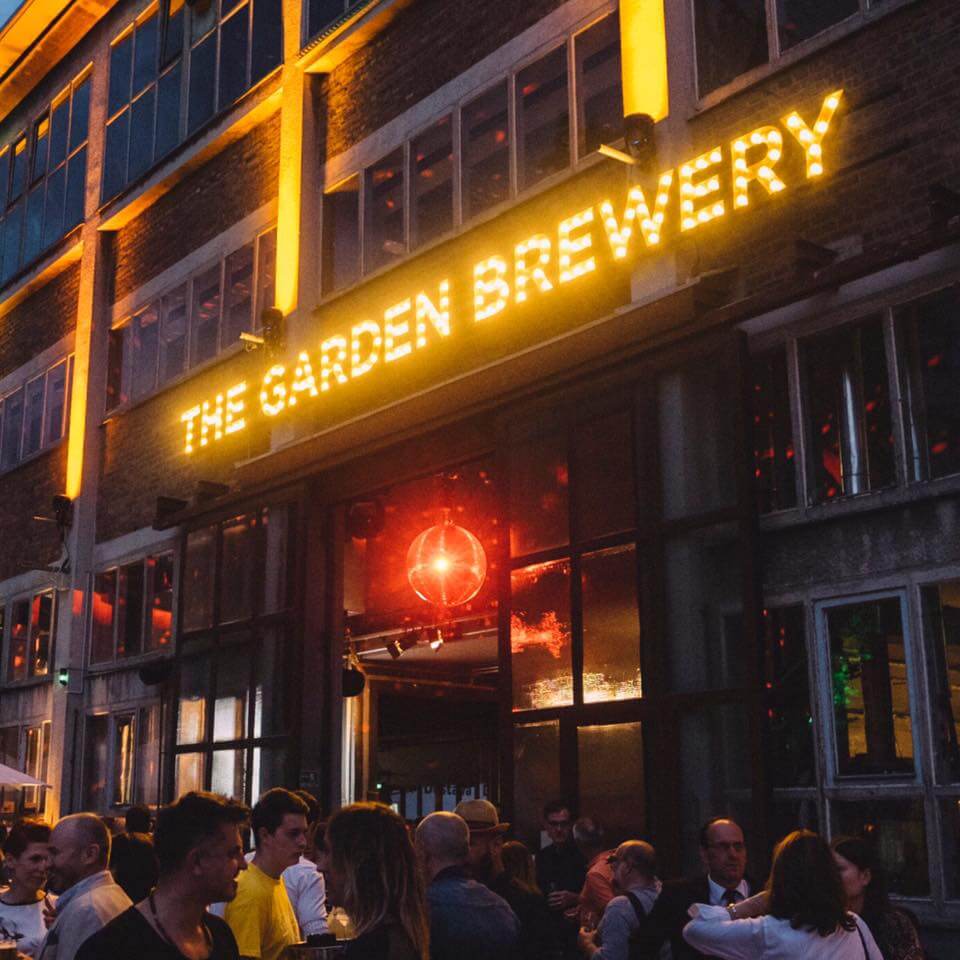
Garden Brewery was established in 2016 and has since grown to become one of the leading craft breweries in Croatia. The Garden Brewery d.d. is a holding company that made its Initial public offering (IPO) in 2020. The Garden Brewery is comprised of three firms: The Bird d.o.o. - craft brewery division, Lula d.o.o. –musical festivals management and Yellow Submarine d.o.o. – craft burgers chain. Garden Brewery was voted EU Championship Brewery in both 2019 and 2020. They developed numerous different beers throughout the years and it is really difficult to single out any of them. I would recommend that you visit their webshop to learn more.
In 2019 their craft beer division (The Bird d.o.o.) total income amounted to 22.3 mil HRK, which makes them the 6th biggest brewery in Croatia by total income. It should be emphasized that 21.9% of their craft beer sales come from exports.
2. Pivovara Medvedgrad
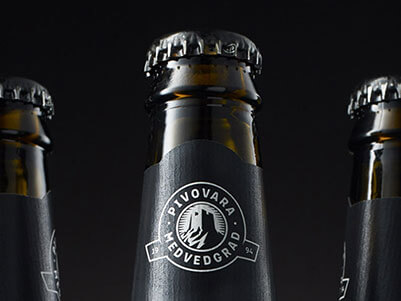
Pivnica Medvedgrad is the oldest brewery on this list. It was founded in 1994 by the firm IPIM which then designed and produced microbreweries. They are considered the oldest independent microbrewery in Croatia. Today they have 121 employees, 4 different pubs, and a new brewery that was opened for the 25th anniversary of its founding. They produced 44 different beers, designed and manufactured 21 microbreweries/craft breweries and it is worth mentioning that 8 breweries in Croatia operate with their production line. Their significance and contribution to the Croatian Craft beer scene cannot be disputed.
They produce year-round beers and seasonal beers. Some of their most famous beers are “Zlatni Medvjed” (pilsner), “Grička Vještica” (strong dark lager), “Dva Klasa” (wheat beer), “Crna Kraljica” (dark lager), and “Fakin Ipa” (Indian pale ale). For more information visit their website.
In 2019 their total income amounted to 17.9 mil HRK, which makes them the 7th biggest brewery in Croatia by total income.
3. Zmajska pivovara
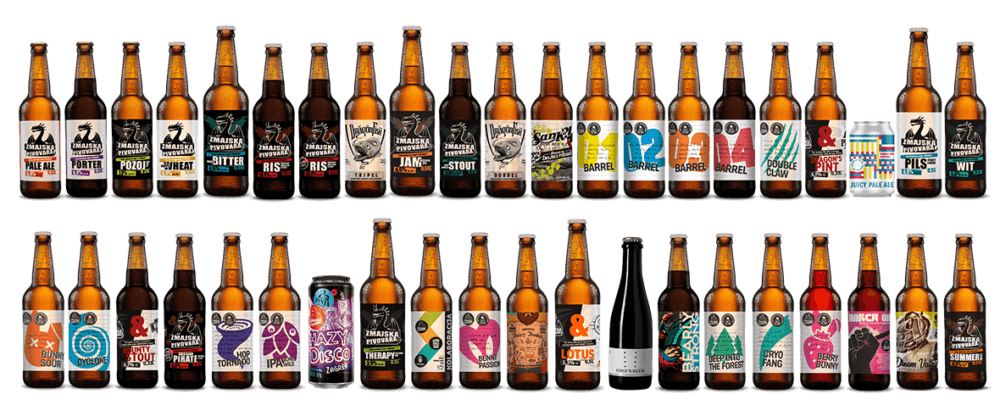
Zmajska Pivovara was founded in 2013 and is considered one of the pioneers of the craft beer movement. Their founder Andrej Čapka was a passionate homebrewer and initiator of the forum site pivarstvo.info. As they mention on their website, their main goal was to introduce different beer styles and to “gradually educate palates for tasting and enjoying beer”. ¸In 2014 Zmajsko introduced their first two beers: Pale Ale (American Pale Ale) and Porter (American Porter). From there they continued to explore different beer styles and flavours and until today they have introduced 45 different beers.
In 2019 their total income amounted to 8 mil HRK, which makes them the 12th biggest brewery in Croatia by total income.
4. Bujska Pivovara
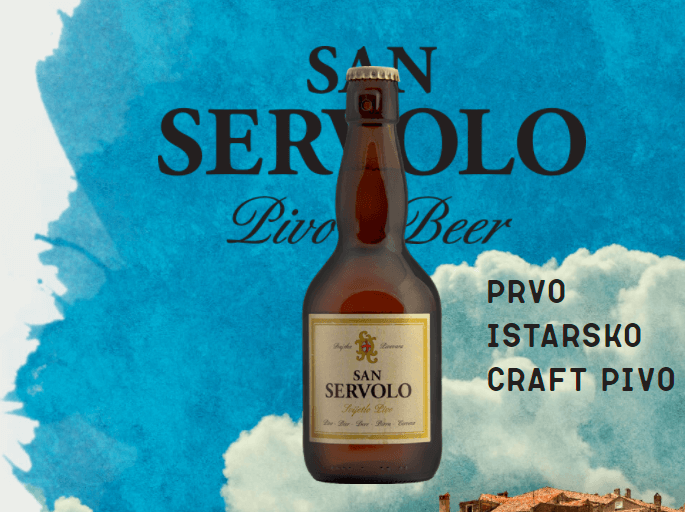
Bujska Pivovara was founded in 2013 and was branded as the first Istrian craft brewery. The brewery was founded to provide local restaurants with a variety of beer, “beer as it used to be, unfiltered and unpasteurized”. The brewery started in a garage with a yearly production of 50 000 L, and in 2016 their yearly production amounted to 800 000 L as reported by gastro.24sata.hr.
Their beer assortment is made out of 6 year-round beers all under their brand name San Servolo: Lager, Red Lager, Dark Lager, IPA, APA, and Gold. They also have two seasonal beers San Servolo Gold Teranino and Truffler. For more information visit their website.
In 2019 their total income amounted to 7.1 mil HRK, which makes them the 13th biggest brewery in Croatia by total income.
5. Varionica Craft Brewery
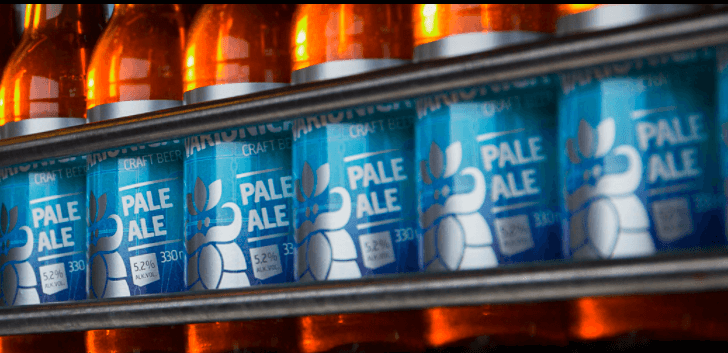
Varionica Craft Brewery was established in 2014 and is located in Pisarovina, near Zagreb. Varionica was founded by beer enthusiasts Matija Mrazek and Davor Simičić. As they emphasize on their website, they focus on “innovation, creativity, and quality without compromise.” Their beer assortment consists of Pale Ale, Deep Dive IPA, Siesta Session IPA among many others which you can check on their website. They are often involved in collaborations with other firms (not just from the craft beer industry) and they love to experiment with different flavours and ingredients.
In 2019 their total income amounted to 4.9 mil HRK, which makes them the 15th biggest brewery in Croatia by total income.
6. Nova Runda
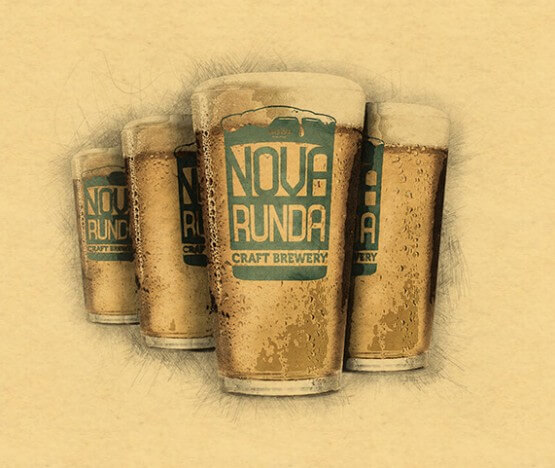
Nova Runda brewery was established in 2013. Their story started with two friends Marko Filipin and Miroslav Šuvak, who, at the time, experimented with homebrewing. The company first started as a gypsy brewery in cooperation with microbrewery Kahli. After 5 years of producing beer at different leased properties, in 2019, they finally opened their production plant in Zabok, near Zagreb.
Their philosophy is that beer should be consumed fresh, that is why you cannot find their beers in bottles but rather just in kegs and cans. Some of their most famous beers are Nova Runda APA (American Pale Ale), C4 (Indian Pale Ale), and Brale (Brown Ale). You can find a detailed list of their beers and the locations of their distributors on their website.
In 2019 their total income amounted to 4 mil HRK, which makes them the 16th biggest brewery in Croatia by total income.
7. Crafter’s
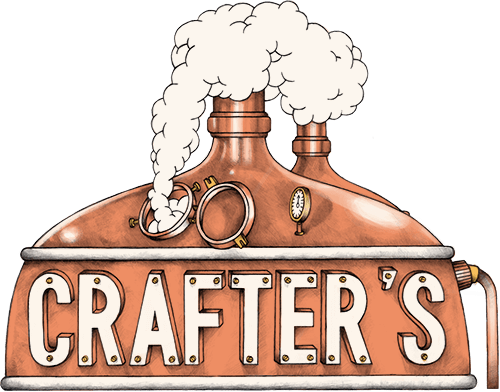
Crafter’s brewery was established in 2016 and is located in Dugo Selo. They produced the first Croatian beer from nutmeg called Muskateer as reported by Jutarnji.hr. The full list of beers that they currently produce can be found on their website.
In 2019 their total income amounted to 2.6 mil HRK, which makes them the 17th biggest brewery in Croatia by total income.
8. Dubrovnik Beer Company
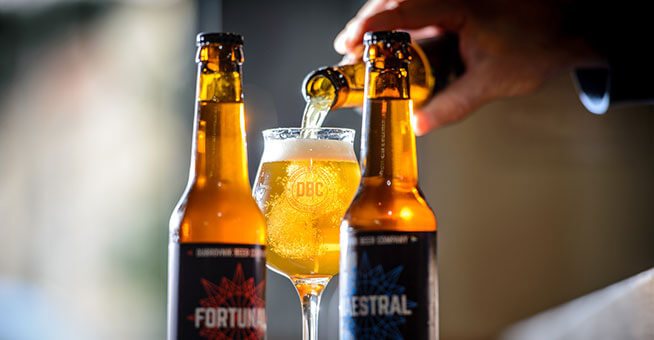
Dubrovnik Beer Company was established in 2016, it is the first brewery in Dubrovnik. Their beer assortment consists of four beers: Maestral (Lager), Fortunal (Pale Ale), Grego (Milk Stout), and GOA (New England IPA). In 2017 they opened their own taproom in Dubrovnik. For more information visit their website.
In 2019 their total income amounted to 2.1 mil HRK, which makes them the 18th biggest brewery in Croatia by total income.
9. Zeppelin Craft Brewery
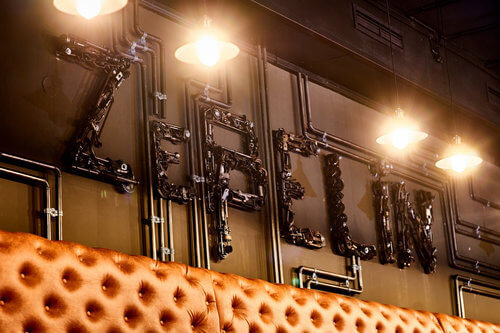
Zeppelin Craft Brewery was established in 2017 and is located in the city of Bjelovar. Their beer assortment consists of Merkat (Golden Ale), Flamingo (American Amber Ale), Rakoon (Porter), Marmun (Weizen), Pilsss (Pilsner) and Tapir (IPA). The names of their beers are based on fictional characters who make up the crew of the Zeppelin. They opened their own pub called “Zeppelin Pub” in Bjelovar and as their slogan says the Zeppelin is “Hovering above all”. For more information visit their website.
In 2019 their total income amounted to 2 mil HRK, which makes them the 19th biggest brewery in Croatia by total income.
10. Beckers Craft Brewery
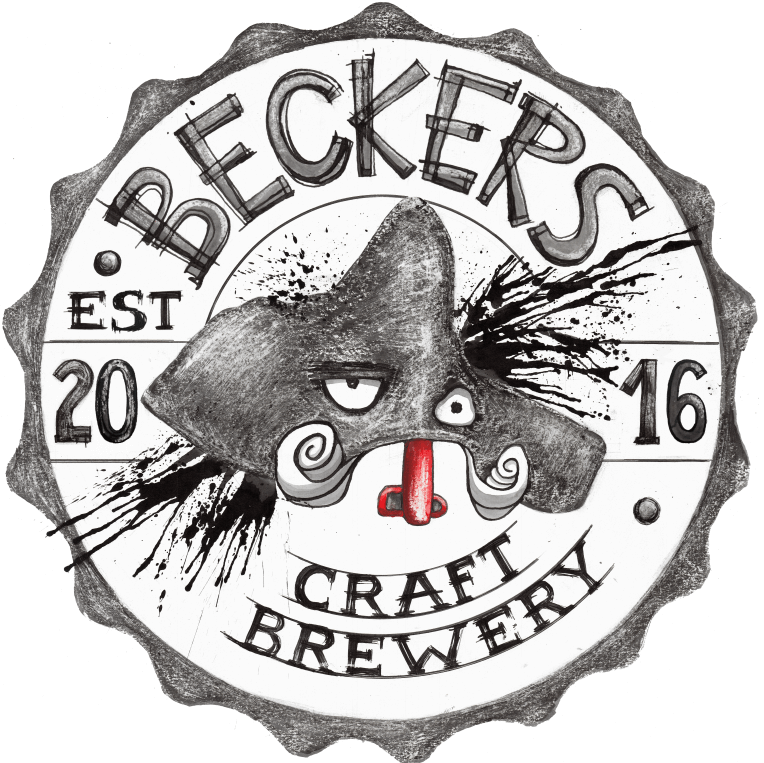
Beckers Craft Brewery was established in 2016 in the city of Osijek. Their beer assortment consists of four beers: American Pale Ale, Irish Dry Stout, Czech Pilsner, and Extra Special Bitter. Their Pale Ale was voted Croatian best pale ale by the app Untapp’d. You can find these beers at their pub in Osijek.
In 2019 their total income amounted to 1.8 mil HRK, which makes them the 20th biggest brewery in Croatia by total income.
There was a total of 84 microbreweries in 2020 according to The Brewers of Europe. It is impossible to name them all on this list. I will use the following paragraph to mention some that did not make the top of the list but are equally important for the development of the craft beer scene in Croatia.
- Bura Brew - founded in 2015, located in Poreč
- L.A.B Split - founded in 2015, located in Split
- Brlog Pivovara – founded in 2016, located in Zadar
- Tap B – founded in 2017, located in Split
- Šibenska Pivovara – founded in 2016, located in Šibenik
- Pivionica – founded in 2015, located in Zagreb
- Primarius Craft Pivovara – founded in 2017, located in Zagreb
- Kampanjola – founded in 2018, located in Svetvinčenat
- Valens – founded in 2016, located in Vinkovci
- Barilo Pivovara – founded in 2018, located in Dugi Rat
In the end, I would like to conclude that the craft beer scene in Croatia is still flourishing and the coming years will bring us many different beer styles, collaborations, and beer festivals. This niche segment of the beer industry is very agile, innovative, and creative. The craft revolution has spread like wildfire reaching every corner of our small country. The likes of Zagrebačka pivovara and Heineken Hrvatska which are the two biggest players in the Croatian Beer industry should carefully observe what is happening in their backyard.
Information presented in this article is based on the data from breweries' company websites.
For more, check out our business section.
For more, check out our lifestyle section.
Milanović: Croatia Embarrassed Itself in Brussels Over Reconstruction Money
ZAGREB, 18 Feb 2022 - Croatia embarrassed itself by not spending any of the post-earthquake reconstruction money, so Brussels charitably extended the deadline, but is denying charity to Croats in Bosnia, President Zoran Milanović has said, blaming that on the incompetence of the foreign minister and the premier.
It's not a "total embarrassment," just an "embarrassment, he said on Friday, commenting on the European Commission's decision to extend the deadline until June 2023, to spend the money from the European Solidarity Fund for the post-earthquake reconstruction of Zagreb.
The president said reconstruction took time and that he accepted that not all the money could have been spent because "that's impossible."
Milanović said he had defended the government from attacks for the slow spending of those funds, but added that the government "has practically not absorbed anything" and that he "would have been proud had we utilized 50%."
He said that in Brussels Prime Minister Andrej Plenković "had to buttonhole someone, sponge" and that perhaps they laughed at Croatia and said, "give them this charity."
However, he said, Croats in Bosnia and Herzegovina "can't be in a situation to ask for simple moldy charity."
They must not be accused of being a disruptive factor because BiH cannot exist without them, Milanović added.
For months he has been accusing the government of not being successful in Brussels in defending the demands of Croats in BiH for changing the election law in order to stop the Bosniak majority from electing their Presidency member and deputies in the Federation entity's upper house.
As an EU member state, Croatia has its vote and can oppose Brussels' decisions, he said.
Zagreb has not exercised that right to defend Croats in BiH, the president said, pointing the finger at Foreign Minister Gordan Grlić Radman.
Croat representatives will have "my full support," Milanović said, adding that the Croatian government "can" and "must" block elections in BiH unless the election law is changed as demanded by local Croats.
He said it was unacceptable of foreign diplomats to say that the elections would be held regardless.
Criticisms against foreign minister
The president also commented on the failure to appoint Croatia's military envoy to NATO, saying that he was being asked only to sign the appointment, without directly participating in the process.
He said the foreign minister was the reason why he and the prime minister had not decided, even after six months, to relieve of duty all the ambassadors whose four-year terms had expired.
Milanović added that Grlić Radman "will do everything just to be liked by his boss."
He dismissed claims that Croatia does not have ambassadors because he, as the president, was pushing members of the Social Democratic Party as candidates.
For more, check out our politics section.
Contract Signed for Lekenik-Sisak Section of A11 Motorway
ZAGREB, 18 Feb 2022 - A contract for the construction of the last section of the A11 motorway, from Lekenik to Sisak, valued at HRK 281 million without VAT, was signed on Friday by the Hrvatske Autoceste (HAC) motorway management company and representatives of the Colas Hrvatska and Geotehnika consortium.
The contract was signed by HAC management board president Boris Huzjan, Geotehnika director Igor Horvat, the president of the management board of Colas Hrvatska Siniša Košćak and a member of the board Goran Tuđan, in the presence of Prime Minister Andrej Plenković, Deputy Prime Minister Tomo Medved, Minister of the Sea, Transport and Infrastructure Oleg Butković, Minister of Construction, Physical Planning and State Assets Darko Horvat and Sisak-Moslavina County Prefect Ivan Celjak.
Plenković underscored that this is a strategic project that will change the dynamic of life in Sisak-Moslavina County.
He added that the 11-kilometer section means a new development impulse to the entire county and in particular for the towns of Sisak and Petrinja.
The funds for the HRK 281 million project will be provided by HAC itself and it is a significant investment for Croatia's GDP, Plenković said, adding that the Pelješac Bridge will be completed with its access roads by the end of the year. By the end of the government's term, the 5C corridor and the Istria Y motorway should be completed, together with the second pipe of the Učka tunnel.
Plenković said that the government plans to invest HRK 45 billion in transport infrastructure in the coming years. Of that amount, HRK 22 billion is for railways, HRK 15 billion is for roads, HRK 3 billion is for ports, and HRK 5 billion is for other forms of transport.
Celjak believes the completion of the motorway will mean a lot for the economy and development in his county. The works are expected to be completed in the next two years.
Minister Butković recalled that HAC advertised the tender and that this is the first contract and investment with its own money.
Following an initial tender in October 2021, the Austrian Strabag company appealed, the State Commission for Supervision of Public Procurement (DKOM) annulled the selection of the Colas Hrvatska and Geotehnika consortium, and the call for tenders was repeated.
HAC announced on 28 January that it had once again selected the Colas Hrvatska and Geotehnika consortium's bid of HRK 281.34 million without VAT to construct the Lekenik-Sisak section of the A11 Zagreb-Sisak motorway as the most favorable bid.
(€1 = HRK 7.5)
For more news about Croatia, click here
Plenković: It Would Be Better if BiH Polls Were Postponed Than Held Under Present Law
ZAGREB, 18 Feb 2022 - It would be better if elections in Bosnia and Herzegovina were postponed than held under the present election law because nothing good will come of it and the country will continue to function poorly, Croatian Prime Minister Andrej Plenković said in Brussels on Friday.
"Parliamentary elections should not be held in October this year as scheduled without changing the election law," Plenković said.
Croatia's position on the matter is contrary to the document prepared by the European External Action Service for a discussion on Bosnia and Herzegovina due to be held at a meeting of EU foreign ministers on Monday.
The document says that negotiations should continue in order to reach an agreement on the constitutional and electoral reform in Bosnia and Herzegovina, and that elections should be held as scheduled regardless of the outcome of the talks.
"The Croatian position is very clear - it's better to give more time for negotiations and postpone the elections if necessary than carry on under the present system because that would be bad for Bosnia and Herzegovina and disastrous for the Croats in Bosnia and Herzegovina," the prime minister said.
"If the present system remains in place, we know in advance what will happen. We do not want electoral engineering to happen again," he added.
Plenković called on the Bosnian Croat and Bosniak parties to focus constructively on the electoral reform so that the Croats would get guarantees that they would be able to choose their representatives in the state presidency and upper house of parliament. He said that Croatia, as a friend and ally, would do all in its power to improve mutual relations and help Bosnia and Herzegovina on its EU path.
Plenković said that an agreement on the electoral and constitutional reform would be beneficial for the functioning of the country, its territorial integrity, mutual respect, and for everyone in Bosnia and Herzegovina to feel good.
Explaining why some of the representatives of the international community, including the EU, had different views about Bosnia and Herzegovina from Croatia's, he cited the lack of understanding of the complexity of the internal structure of Bosnia and Herzegovina and the need to simplify it, which he said would not lead to anything good.
Plenković said that those who did not know the situation in Bosnia and Herzegovina well enough were focusing on three points, the first being a cease-fire agreement that later became the Dayton peace agreement, which became the country's constitution. The second point is the ruling by the European Court of Human Rights in the Sejdić-Finci case and other cases which called for an end to discrimination against three percent of citizens of Bosnia and Herzegovina who are not members of any of the three constituent peoples, as 97 percent of citizens identify themselves as Bosniaks, Serbs or Croats. The third point is present efforts to simplify the whole situation.
"When someone who is not from Bosnia and Herzegovina or neighboring countries comes and wants to see how the country is functioning, they see a structure they have not seen anywhere else. They realize that there is one state, two entities, 10 cantons in one of the entities, houses of peoples, and so on. And then the logic of simplification comes in, but in that simplification, you cannot sideline the rights of one of the constituent peoples who voted for Bosnia and Herzegovina's independence in 1992," Plenković said.
He said that the Venice Commission had favorably assessed the Croat proposal to amend the constitution, under which in elections for the state presidency one representative of the Croats and other ethnic groups and one representative of the Bosniaks and other ethnic groups would be elected from the Bosniak-Croat Federation entity and one representative of the Serbs and other ethnic groups from the Serb entity of Republika Srpska.
"That would resolve everything. The constituent peoples would be retained, the others would be included and no one would be discriminated against, and everyone would be allowed to stand as a candidate," Plenković said.
For more, check out our politics section.
Prime Minister: Measures Will Protect Citizens and Economy From Energy Price Rises
ZAGREB, 18 Feb 2022 - Prime Minister Andrej Plenković said on Friday that the package of measures for cushioning the electricity and gas price rises, worth HRK 4.8 billion, was a wise state intervention that would, as of 1 April, protect citizens and a large part of the economy from rising energy prices.
"This way, we are showing the government's readiness to make a wise intervention that benefits citizens in key moments," Plenković said, talking about the package of measures at a government session.
The measures apply to all citizens, a large part of the economy, especially micro and macro businesses, and special measures have been introduced for socially vulnerable groups, as well as for pensioners, farmers, and fishermen, the prime minister said.
"In addition to the caps on the prices of petroleum products, we have made a good, clear framework which also involves tax relief, social transfers, and subsidies, and which will cushion the price rise as of 1 April," he said.
The prime minister also said that over the past two days, based on well-prepared documentation for the European Commission, it had been decided that the deadline for using the money from the European Solidarity Fund for earthquake relief in Zagreb would be extended for another year, from June 2022 to June 2023, to overlap with the deadline for the use of money allocated for the earthquake in Banovina.
He said that he now expected "intensive work and dynamics of the reconstruction process" in order to use that money and engage other sources and ensure as soon as possible that the reconstruction process would accelerate.
For more, check out our politics section.
Zagreb Stock Exchange Indices End Week in Red
ZAGREB, 18 Feb 2022 - The main Zagreb Stock Exchange (ZSE) dropped for the second consecutive day on Friday, the Crobex by 0.8% to 2,121 points, and the Crobex10 by 0.99% to 1,289 points.
The indices also ended the week in the red, with the Crobex falling by 2.01% and the Crobex10 by 2.25%.
All sector indices fell today, and the transport index saw the biggest decrease, of 2.6%.
Regular turnover amounted to HRK 6.6 million, or about HRK 2.8 million less than on Thursday.
The most traded stock was Hrvatska Poštanska Banka, which turned over HRK 948,000, its price stagnating at HRK 790.
A total of 44 stocks traded today, with eight of them registering price increases, 21 recording price decreases, and 15 stagnating in price.
(€1 = HRK 7.527023)
For more, check out our business section.
‘Movement Is Healing’: Meet the Man Who Walked 1100 Km, Proving Nothing Is Impossible
February 18th, 2022 - Adventurer Mihael Strle embarked on a long-distance hike to raise awareness of rheumatoid arthritis and completed the 1100 km trail in three months
Ten years ago, Croatian adventurer Mihael Strle found out he was suffering from rheumatoid arthritis, a condition that eventually had him walking with crutches. A few days ago, Mihael completed a 1100 km long hiking adventure.
The adventure in question is Via Adriatica, a stunning long-distance hiking trail spanning from Cape Kamenjak in Istria to Prevlaka peninsula south of Dubrovnik. It took Mihael three months to reach the end of the trail, and on the way he faced merciless winds, snow, ice, and -20°C temperatures. Joined by his pup Oscar, he conquered the highest mountain peaks in Croatia, reports RTL.
How does someone with arthritis walk for three consecutive months? ‘Slowly’, said Mihael with a laugh.
‘I can walk like any other person, I just have certain other difficulties that are slowing me down. I have to listen to my body more closely, and pay closer attention to the trail’, he said.
He often suffered pains as he was hiking, and had symptoms of overexertion that are otherwise kept in check with physical therapy, but he says he could bear it.
‘As I was getting further into the trail, the conditions kept changing. The route is designed in a very interesting way, it gradually gets more challenging. After I departed from Cape Kamenjak, my first issue was realising that I carried 20-30kg on my back, which was a bigger problem than walking. Then you get to the first mountain, Učka, where I saw that I’d be ascending, that it’s going to be hard; then you get to a more ‘serious’ mountain Velebit, followed by Dinara, so overall, as inexperienced as I was, I kept learning gradually, day after day, and it was challenging’, said Mihael for RTL Direkt.
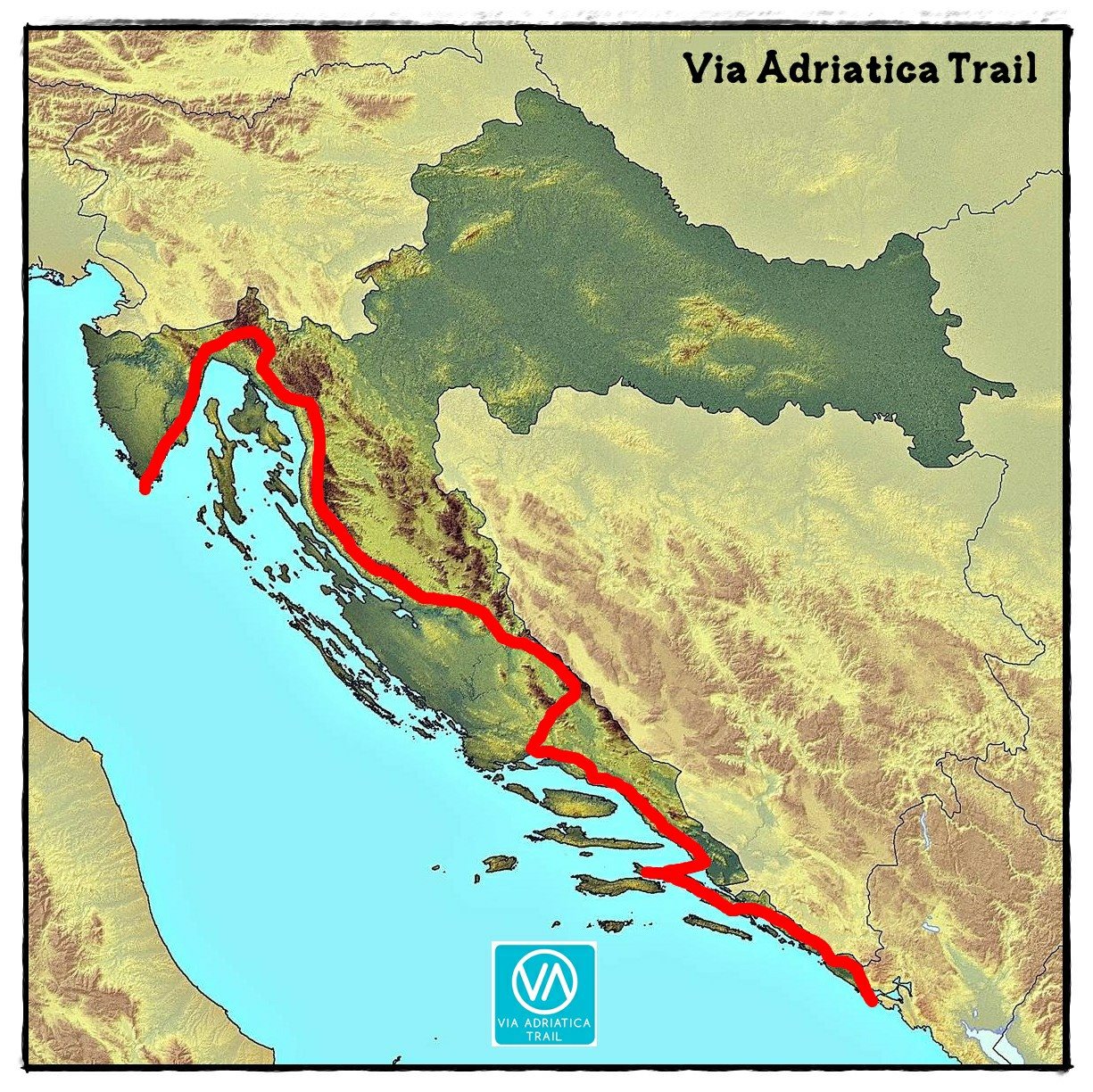 Image by Via Adriatica Trail Facebook
Image by Via Adriatica Trail Facebook
There were moments when Mihael thought it would be easier to give up, but he had a drive and motivation to keep walking. The latter was the project named ‘A step above’ (Croatian: Korak iznad), aiming to raise awareness of arthritis.
‘People would often ask me about the project over the last ten years, and they were always surprised to hear it’s a broad-spectrum disease that affects young people as well. This is what I’d like to raise awareness of, that it’s not just the elderly who are affected. I’m now in a phase of remission and rest; movement has healing properties, that's part of what made me decide to walk’, said Mihael.
He certainly proved he can do a lot despite having arthritis, and has lived a real winter adventure. In the three months he spent on the trail, Mihael spent the night outdoors in a tent 25% of the time, and otherwise slept in mountain lodges and various shelters.
‘The logistics were the most challenging part. There isn’t a single store [on the trail] all the way from Rijeka to Knin, nor another option to get food, so it was a big help to me to have friends and other people on the trail who supported me. There are so-called trail angels who we can rely on if needed, there’s a group we can reach out to for help, there’s also the Mountain Rescue Service, but my friends were my biggest suport’, said Mihael.
Trail angels are people living near the long-distance trail who jump in to help the Via Adriatica hikers whenever needed, having them over for a meal, assisting with supplies and medicine, or even providing accommodation for a night or two. This is all done on a voluntary basis.
Naturally, Mihael was very emotional when he reached the end of the trail in Privlaka.
‘On the one hand, I was very sad it was over, but at the same time I was also very proud of myself and pleased with everything I’ve done’, he said.
This is not the first time he embarked on an adventure of this sort. Mihael previously cycled from Zagreb to Turkey, and kayaked from Korčula island in southern Dalmatia all the way to Istria. The latter project took two weeks of rowing and another week to recuperate.
He said he truly believes that movement gives life, that it’s healing. ‘I have a need to get better every day, to focus on my health, my training, and to do what I love in order to get healthy’, Michael said.
He used to work as a medical technician, but his life changed and he discovered new life values and new ways of thinking.
‘I’m not that focused on my career anymore, on my profession and work, as much as on the quality of life and interpersonal relationships. A situation like that simply opens your eyes’, he said.
To anyone faced with a similar diagnosis, Mihael would say to take some time to accept it, to process it, and then move forward. ‘You have to keep your spirits up. Even a single small step further every day is a big step for me’, he said.
Follow other hikers on their adventures over on the Via Adriatica Trail Facebook page.
4th Century Coins Found on Ugljan Island
February 18th, 2022 - Archaeological research was conducted on St. Michael's fortress on Ugljan island, which is set to become a tourist attraction dedicated to the cultural heritage of all Zadar islands
Archaeological research has been underway at St. Michael's fortress on Ugljan island for several years now. During the third excavation campaign, archaeologists found modern, medieval and late antique coins, as well as 14 fragments of stone sculpture.
As reported by Naši Školji, a small amount of archaeological material was collected, mostly ceramics, which will be stored at the Archaeological Museum in Zadar after preliminary processing and analysis.
Research was conducted by the company Arheolog d.o.o. from November 3rd to December 8th, 2021. Archaeologist Damir Martinov, head of the company that carried out the work, explained that the recent research provided valuable insight into the stratigraphy and chronology of the embankment on the south-west side of the fortress, which once used to house the church of St. Michael.
‘Several layers of the embankment have been documented, dating to different periods. The two upper layers of the embankment were formed during the 20th century, as evidenced by the remnants of various materials from recent history. The thick upper embankment on the southern side, made of stone and soil, was consolidated by a dry stone wall, and was made by demolishing the ruinous Romanesque-Gothic church of St. Michael after World War II. Inside the embankment, thirteen stone artefacts from the church were found (fragments of pillars, lintels, capitals, consoles, arch openings, etc.). The lower, thinner embankment layer probably formed during the first half of the 20th century’, explained Martinov.
One of the embankment layers dates to the early modern era, i.e. between the 16th and the 18th centuries. Three layers date to late middle ages; a silver Venetian coin was found in one of the layers, minted for the Doge of Venice Andrea Dandolo (1343-1354).
In another late medieval layer, researchers discovered late antique coins dating to the first half of the 4th century - a significant find that points to activity on the site in late antiquity.
A captain's house dating to the 1400s was also discovered at the fortress during an earlier research campaign.
‘Archaeological research was conducted as part of the reconstruction and revitalization of St. Michael's fortress, which is a protected cultural asset of the Republic of Croatia and is supposed to contribute to the sustainable economic development of Ugljan and Pašman islands, as well as development of cultural and active tourism. A project for the reconstruction of the fortress will be developed based on the results of the archaeological research. So far, a geodetic study and geodetic survey, a conservation study and an architectural survey of the fortress have been completed’, said Preko Mayor.
There are big plans for the fortress of St. Michael, which is supposed to become a so-called Castle of Island Stories, an interpretation center that will introduce visitors to the heritage of all Zadar islands.
Research was conducted by archaeologists Damir Martinov, Domagoj Maurin and Dominik Kelava of the company Arheolog, in collaboration with archaeology students Pio Domines Peter, Domagoj Knez, Luka Žarković, Eugen Fritz Prgomet and Leona Valenta. The experts were assisted by four workers from Ugljan.


